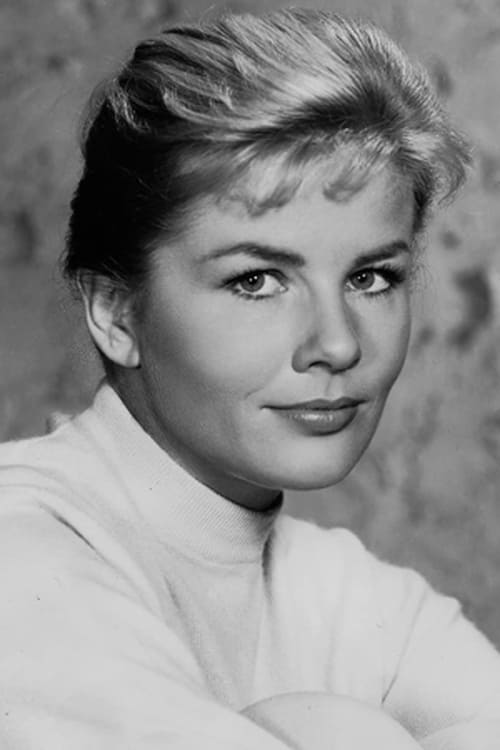|
|
|
|

|
Das Donkosakenlied (1956)
Character: Helga, seine Tochter
After the death of his mother, little Peter lives with his great sister Helga at his adoptive father Professor Hartmann. Peter is seriously ill, can not get upset and therefore also on the advice of his doctor Heinz Stark no more music. Even his revered Donkosaks , who remember him with their songs to his Russian mother, can no longer listen to him on the radio. It is all the more pleasing to him when the choir, during a tour with their conductor Serge Jaroff and their manager Rolf Bender, has an autopanne near his home. While Chauffeur Karl repairs the bus, Peter sings the choir's title The Evening Star, glowing us two - a song of his mother, which the choir has never heard before.
|
|

|
Der Arzt Stellt Fest… (1966)
Character: Frau Maurer
A serious Swiss melodrama/documentary about abortion, marketed as a sexy exploitation movie in the US. The film contains real medical footage.
|
|

|
...Y eligió el Infierno (1957)
Character: Elsa Wolff
In Western Germany, two brothers and their organization help people escape to non-communist Germany. A policeman chasing them falls in love with the sister and feels divided between love and duty.
|
|

|
Zum Teufel mit der Penne (1968)
Character: Frau Tell
Pepe Notnagel (who inexplicably had his name changed from the first movie's Nietnagel) and his classmates scheme to get around doing any actual school work by cheating or sending their teachers to the sanatorium. A Swiss documentary film maker disguises himself as his brother in law, who got a position as an exchange teacher, to aid his project of making a movie about the current youth.
|
|
|
|

|
Kiedy miłość była zbrodnią (1968)
Character: Erika Badke
A war drama showing the functioning of Hitler’s “racial purity” law, forbidding foreign workers from any contact with Germany. Foreigners on forced labor in Nazi Germany.
|
|

|
Heimat, deine Lieder (1959)
Character: Eva Weigand
A romantic musical comedy about a young kindergarten teacher who suddenly meets her love.
|
|

|
Der Pastor mit der Jazztrompete (1962)
Character: Hanna Osterwald
When the Lutheran pastor Roland retires, the young priest Roll shall replace him. He plays the trumpet, loves Jazz and his methods are unconventional: From the first day on he offends the village's notables, but he doesn't care so much since he especially targets the youths, wants them to get back to the church again. However the mayor agitates against him, manages to endanger Roll's success. The conflict leads to vandalism and open violence against Roll.
|
|

|
Haie und kleine Fische (1957)
Character: Edith Wegener
Four young German naval cadets begin their military service in 1940; only one of them will survive.
|
|

|
Oklahoma John (1965)
Character: Georgina White
Edward, a powerful rancher, serves as a real chief of a town near the Mexican border. The arrival of Oklahoma John, new sheriff, not to your liking. The new lawman faces Jimmy, the son of the chief and his buddy.
|
|

|
Scotland Yard jagt Dr. Mabuse (1963)
Character: Nancy Masterson
The spirit of the evil Dr. Mabuse takes over the body of a famous professor. The professor/Dr. Mabuse then begins a new crime wave that terrorizes the city.
|
|

|
Das indische Grabmal (1959)
Character: Irene
Seetha and Harold Berger are rescued from the desert by a caravan and brought to a small village. However, the greedy owner of the house where they are lodged betrays the law of hospitality and reveals their location to Prince Ramigani. The couple tries to escape but is hunted and captured by Ramigani and his men. Meanwhile Irene Rhode and her husband Walter Rhode suspect that Maharaja Chandra is not telling the truth about Harold's destiny. The conspirator Ramigani forces Seetha to accept to get married with Chandra to provoke the wrath of the priests and get the alliance of Prince Padhu and his army. In the meantime, Harold succeeds in escaping from the dungeon and seeks out Seetha to save her.
|
|

|
Der Tiger von Eschnapur (1959)
Character: Irene Rhode
In Eschnapur, a German architect saves the life of the Maharajah's favorite temple dancer and becomes Maharajah's friend but their friendship is tested when the architect and the dancer fall in-love, triggering the Maharajah's vengeful ire.
|
|

|
Juanito (1960)
Character: Carmencita
In the middle of a revolution, the son of a president ends up in the hands of a German hunter who welcomes him into his home, not knowing his origin.
|
|

|
Die Herren mit der weißen Weste (1970)
Character: Monika Knauer
Bruno Stiegler, a boxing promoter with a disreputable past, returns from America to Berlin to make some big things again with his friends. Fatally, he is always preceded by some gentlemen from better circles who are developing amazing criminal activity in their old days. They are led by Oberlandesgerichtsrat a. D. Herbert Zänker, whom it still hisses, that he could bring in his term Bruno never behind bars.
|
|

















